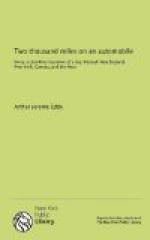Then, too, the hotels of Buffalo had expected so much and were so woefully disappointed. Vast arrays of figures had been compiled showing that within a radius of four hundred miles of Buffalo lived all the people in the United States who were worth knowing. The statistics were not without their foundation in fact, but therein lay the weakness of the entire scheme so far as hotels were concerned; people lived so near they could leave home in the morning with a boiled egg and a sandwich, see the Exposition and get back at night. Travellers passing through would stop over during the day and evening, then go their way on a midnight train,—it was cheaper to ride in a Pullman than stay in Buffalo.
We might have taken rooms at Rochester, running back and forth each day in the machine,—though Rochester was by no means beyond the zone of exorbitant charges. Notions of value become very much congested within a radius of two or three hundred miles of any great Exposition.
The Exposition was well worth seeing in parts by day and as a whole by night. The electrical display at night was a triumph of engineering skill and architectural arrangement. It was the falls of Niagara turned into stars, the mist of the mighty cascade crystallized into jewels, a brilliant crown to man’s triumph over the forces of nature.
It was a wonderful and never-to-be-forgotten sight to sit by the waters at night, as the shadows were folding the buildings in their soft embrace, and see the first faint twinklings of the thousands upon thousands of lights as the great current of electricity was turned slowly on; and then to see the lights grow in strength until the entire grounds were bathed in suffused radiance,—that was as wonderful a sight as the world of electricity has yet witnessed, and it was well worth crossing an ocean to see; it was the one conspicuous success, the one memorable feature of the Exposition, and compared with it all exhibits and scenes by day were tame and insipid.
From time immemorial it has been the special province of the preacher to take the children to the circus and the side show; for the children must go, and who so fit to take them as the preacher? After all, is not the sawdust ring with its strange people, its giants, fairies, hobgoblins, and clowns, a fairy land, not really real, and therefore no more wicked than fairy land? Do they not fly by night? are they not children of space? the enormous tents spring up like mushrooms, to last a day; for a few short hours there is a medley of strange sounds,—a blare of trumpets, the roar of strange beasts, the ring of strange voices, the crackling of whips; there are prancing steeds and figures in costumes curious,—then, flapping of canvas, creaking of poles, and all is silent. Of course it is not real, and every one may go. The circus has no annals, knows no gossip, presents no problems; it is without morals and therefore not immoral. It is the one joyous amusement that is not above, but quite outside the pale of criticism and discussion. Therefore, why should not the preacher go and take the children?




